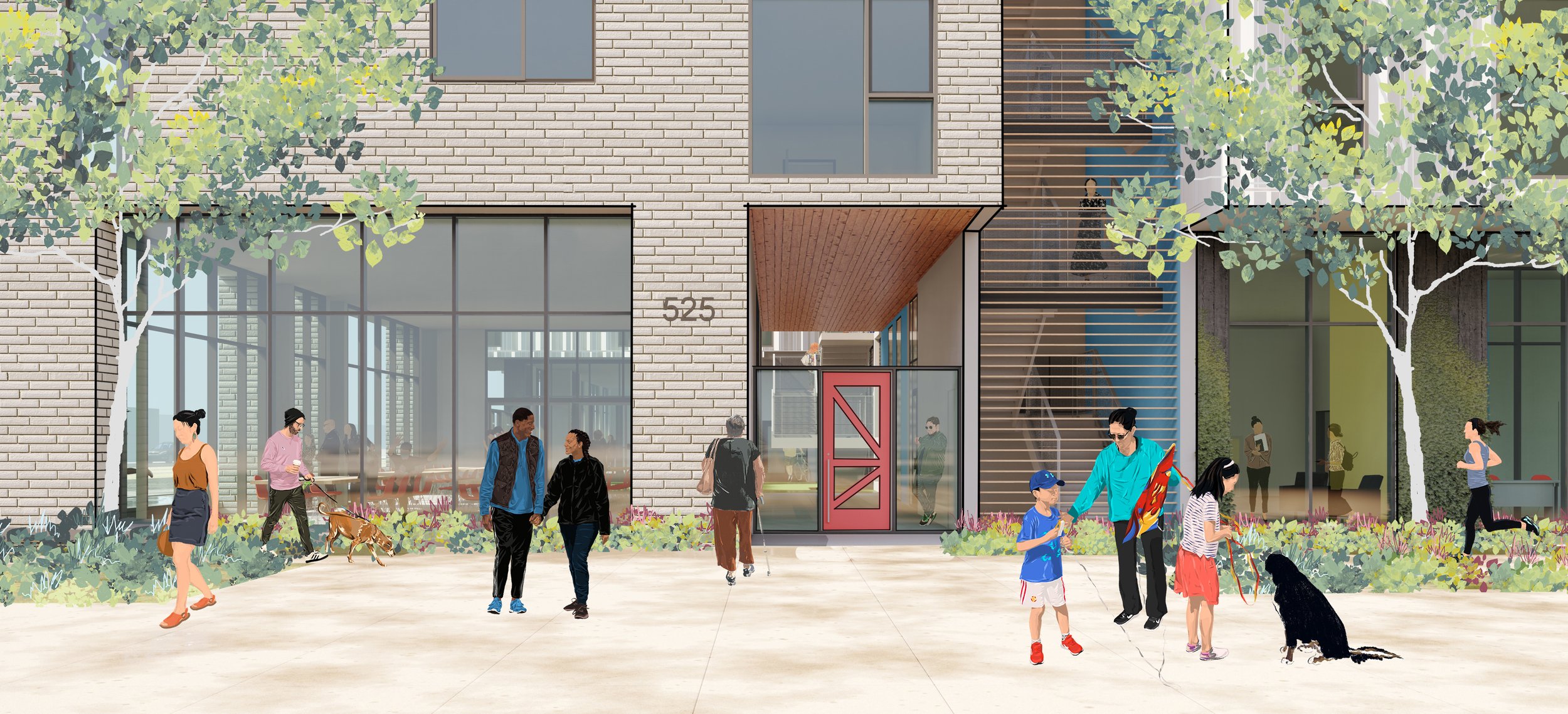
New affordable housing planned in East San Jose
What type of community are we building?
Our Goal: Our goal for the development of 525 N. Capitol Ave is to create a culturally-specific affordable housing community for displaced and longtime residents of East San Jose, and be a permanent housing solution for the formerly and chronically homeless, veterans, persons with disabilitiesseniors, persons living with disabilities, and other low-income families and individuals.
To be designed by David Baker Architects, this project will be one of a number of Community Development Partners’ (CDP) developments contributing to solving the housing affordability crisis in the Bay Area. Because many low-income households may never be able to afford market-rate housing, the amenities and programming at our property will be tailored to accommodate residents for the long-term, while simultaneously supporting them to achieve long-term goals, like homeownership or an advanced degree.
525 N. Capitol Ave. will comprise 160 units with a mix of 60 studio, 64 one-bedroom, 28 two-bedroom, and 8 three-bedroom units. All homes will be available to households earning 60% or less of the area median income, with 40 units designated as Permanent Supportive Housing (PSH) for formerly and chronically homeless individuals and another 25 eligible for housing vouchers for homeless veterans.
The ground floor of the development will include personal enrichment space, resident services and property management offices, a lobby and common area as well as bike parking, car parking, and a communal outdoor courtyard. The development will leverage existing community assets, including nonprofit partner Veggielution. Veggielution will distribute healthy food sourced from its local community farm and operate a kitchen out of the ground floor with employment opportunities for tenants and local residents.
How is this development possible?
525 N. Capitol Ave. was awarded $15 MM in gap financing through the City of San Jose and $4 MM in Infill Infrastructure Grant funds from the California Department of Housing and Community Development (HCD) . Other potential sources include Measure A funds from Santa Clara County. The project will be leveraging 4% Tax Credits and Tax Exempt Bonds to complete it’s financing.
Who is CDP?
Community Development Partners
Community Development Partners’ mission is to create life-enhancing housing that transcends the fundamental goal of providing high quality homes by building innovative and sustainable developments with a focus on long-term community engagement.
Founded in 2011, CDP develops and operates sustainable, life-enhancing affordable housing with a focus on long term community engagement and innovative design. As a mission-driven, forward-thinking organization, CDP is focused exclusively on creating vibrant affordable housing communities that incorporate art, public parks, gardens, access to fresh food, and cultural and social programming. A Certified B-corporation, CDP is dedicated to the highest standards of social equity, diversity, environmental stewardship and public transparency—a reflection of their dedication to mission and priority of impacts over profit. Today, CDP has successfully built, or preserved, or is actively developing over 5,100 affordable homes throughout Oregon, California, Nevada, Colorado, Arizona, and Colorado.
Who are our development partners?
Founded in 2008, Veggielution connects people from diverse backgrounds through food and farming to build community in East San Jose. Veggielution utilizes a unique community farm model that mobilizes volunteers to cultivate and grow healthy crops, which are then made available to its program participants and local residents. Its 6-acre community farm and gathering space is located in Emma Prusch Farm Park in the Mayfair neighborhood. Veggielution is one of five members of the Si Se Puede Collective, a coalition of respected organizations working in the Mayfair community on issues of basic needs access, education, arts and culture, community development, and food and environmental equity.
Housing Choices was founded in 1997 by parents and service providers who recognize that, without access to affordable housing, people with developmental and other disabilities would be unable to make a successful transition from living in the family home to living in their own homes in the community. In addition to assisting clients to find and apply for affordable housing, Housing Choices has also created a lasting commitment to affordable housing by working with developers at eighteen different Partner Properties. At these Partner Properties, Housing Choices administers a housing waiting list for set-aside units specifically for people with developmental and other disabilities, and help current residents successfully maintain their housing stability.
Abode is the Bay Area’s largest homeless housing and services provider. Abode’s Services coordinates health and supportive services for participants in shelter and supportive housing programs, offering comprehensive on-site assistance. Abode has also cultivated strong relationships with more than 40 local service providers to connect participants to additional social services. The on-site services provided at housing sites include job training, parenting classes, financial literacy, computer training, case management, health education and activities, and many others.
Community Engagement Timeline
September - October 2021
Stakeholder calls with community-based organizations to begin exploratory conversations about programming for the ground-floor community space.
October - November 2021
Interviews with low-income households and persons with lived experience of homelessness to understand the service gaps for this community.
December 14, 2021
Ground floor programming Co-Design Workshop with community-based organizations.
March - April 2022
Stakeholder calls with disability organizations and advocates to understand the needs of this community.
May 5, 2022
Accessible Design Workshop with disability advocates, service providers, and persons living with disabilities to inform accessibility design of the building.
Accessible Design Summary - English
May 26, 2022
Informational Community Meeting with neighbors, community organizations, and the broader public to share project information, answer questions, and listen to feedback.
Community Meeting Presentation - English
Community Meeting Question & Answer Summary - English
Initial Community Engagement Summary - English
July 12, 2023
Informational community meeting #2 with neighbors, community organizations, and the broader public to share project updates, including how community input has been incorporated, and provide information about the construction timeline.
To stay informed about the project progress, join our mailing list.
Public Comments Box
Share your questions and comments about the project with our development team using the form below.



